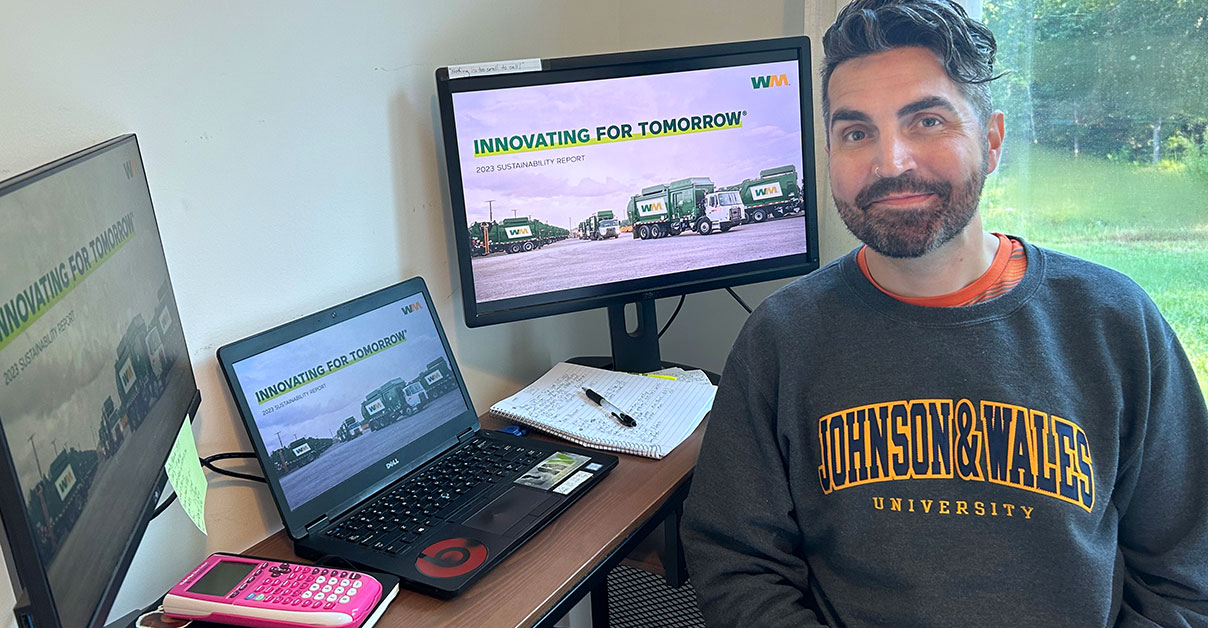“I am always 100% ready to show up and fight each day.”
When Jonathan Garrigues’ professor, David Cartwright, said, “Jonathan was one of the best students I have ever had in my twelve years of teaching accounting and finance courses at JWU,” it piqued our curiosity. What makes someone a top student in JWU Online’s Master of Science in Finance degree program?
A Marine Corps veteran who earned a Purple Heart after being wounded in Fallujah, Iraq, now an Account Executive for a large corporation, Jonathan is juggling school, work, and family life. If you are a student or considering enrolling in a program at JWU Online, read on to learn what drives Jonathan and his suggestions for success in JWU Online’s business and financial master’s degree programs.
ACCEPTED AT JWU
The day I was accepted into the Master of Science – Finance program through Johnson & Wales Online, I was so excited that I went to the Charlotte, North Carolina campus, just to walk around. I visited the bookstore and bought a JWU shirt and a sticker for my car. Living near JWU’s Charlotte campus, everyone knows JWU as the “culinary school.” So, when I tell them I’m going to school at JWU, they say, ‘Oh, you go to Johnson & Wales. Are you a chef?” And I respond, ‘Nope!’
The crazy cool advantage is that, although I am an online student, I will be able to join the live graduation on the Charlotte campus and walk with other JWU students to accept my diploma. I traveled to Rhode Island when my older brother graduated from Naval Officer Candidate School — but it was too much of a trek for my entire family to go. Graduating in Charlotte, right down the road from where I live, I can have my whole family with me.
LETTING GO OF A DREAM
My dreams during my twenties were not about a career in business. About halfway into my 11-and-a-half years in the Marine Corps, I went from the Marine Corps Reserves, onto active duty. My goal as I transitioned onto active duty was to become a Marine Corps Aviator – I wanted to fly. Most Marines go into the Reserves after serving on active duty; I served first as a Marine Reservist.
During my time as a Reserve Marine, I was a Sergeant and had been in combat in Iraq. When I went on active duty, I picked the fastest track to complete my undergraduate degree — a BS in Liberal Arts, with a concentration in counterterrorism. I figured it would be a good fit during my military career, and afterwards for potential jobs within the Three Letter Agencies (CIA, FBI, NSA, and others).
As an active-duty Marine, I worked for three-and-a-half years with an OSO flight recruiter and was the only person out of a dozen candidates that passed the Aviation Selection Test Battery (ASTB) on the first try. I completed all of the requirements for the Bureau of Medicine and Department of Defense medical evaluation review boards.
I had to get a medical waiver as part of my officer candidate package. The upper age limit to become a pilot was 28 years old, and I was almost 30 so I had an age waiver. I had two daughters at the time, so I also had a dependency waiver. Finally — even though they are all completely coverable in PT gear — I had way too many tattoos. Why would the Marine Corps want to allow a guy to become a pilot, who’s almost 30 and has been blown up, when they’ve got all these 22-year-old guys with no kids and no tattoos who can train to become commissioned officers and fly?
After nearly four years as an officer candidate, my flight package never made it in front of an officer selection review board. I had to accept that I was not going to fly. If I couldn’t fly, I wasn’t interested in becoming an open contract “ground officer;” and I never planned to stay enlisted long-term. I got off of active duty in 2012 with the goal to attend law school.
NEW PLANS AND DREAMS
I had made good grades in my undergrad program and scored pretty high on the LSAT. During 2014, I was offered a full scholarship to attend law school — 50% based on academic performance and the other half for being a wounded warrior. I finished my first year of law school, then went through a divorce. I moved back home to be closer to my young girls. It hadn’t been my wish to leave law school – or to not become a Marine Corps pilot. But I have no regrets; I believe God has a plan for everything.
Fast forward a few years, and I was hired by WM (Waste Management). Always believing that higher education would be in my future, I was determined to keep pushing forward. To be able to live close to my kids, and without a law school close enough to home, I needed to pursue a different degree program.
WM rolled out a partnership program with Guild Education a few years back. Interested in the long list of master’s programs, I reached out to the WM – Guild Education Growth Coach to find out what was available. As one would reasonably expect, they wanted me to pick something related to my career.
CHOOSING THE MASTER OF SCIENCE – FINANCE PROGRAM
Of the 44,000+ employees at WM, a small percentage of us are on the white-collar/contracts/sales side of the business. Most employees in the company are part of operations or CDL drivers. We are essentially the largest hauling company in North America. Yes, we haul refuse and recycled material, but we are ultimately a logistics hauling company. I was hired to do sales/account management. I don’t deal at all with trash collection directly, but I certainly am in the waste industry.
Many of the folks in my organization’s leadership tiers have MBA degrees. When the opportunity opened up through Guild Education, I didn’t want to have the same MBA degree as my senior positioned colleagues. I already knew that I loved math; I had taken just about every level of math you can take in college. At WM, I already spend about 40+ hours per week with a TI-84 calculator in my hand, working with haul rates, profitability margins, tonnage reports, contracts, and pricing. I wanted a degree that would set me apart at my specific company, so I chose JWU’s MS in Finance degree program.
I took the large list of optional classes, and went to my boss, her boss, his boss, and the boss of the pricing finance team for the entire South Atlantic. All of us got together on a Teams meeting. They looked at the program’s list of JWU classes that I needed to take and said, “Do this, don’t take that, that’s not useful for your specific career, take that instead …” etc. Together we chose the classes that were most relevant to my corporate career at WM.
Some of the options are not as directly related to my corporate career — for example, becoming a Certified Financial Planner (CFP). Financial planning is incredibly interesting and very applicable to daily life — managing your own finances, forecasting out your retirement, planning for kids’ college education — all good things for someone to know how to do. How can you have a master’s in finance and not be able to really nail down and forecast out an accurate budget?
So, it makes sense that financial planning is part of the program. However, I’m not looking to leave the program with CFP after my name – just MS. If my company said, “There’s this crazy, cool opportunity and we need you to be a CFP,” I feel confident that I could cram for that exam, and based on my studies at JWU, I would expect to do well.
THE INFLUENCE OF MILITARY COMBAT
Reflecting back to my experience in the Marine Corps, working in corporate America shares some similarities with a military career. If you can thrive in the Marine Corps, then you can thrive in a large company. You have to be professional. You need to be self-motivated, driven, and organized.
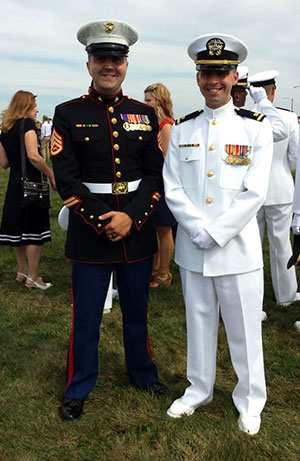
I enlisted in the Marine Corps to fight alongside my older brother, Brad, long before I ever dreamt of pursuing a corporate career. When terrorists attacked the World Trade Center and the Pentagon on 9/11, I was a freshman in college. My older brother had joined the Marine Corps the summer prior to the attacks.
During July 2001, two months before 9/11, my younger sibling and I toured the World Trade Center. I have a photo of us standing together on the top floor observation deck. When two months later the towers were gone, it was clear to me what I needed to do. I enlisted in the Marine Corps.
I felt like we were going to war — 9/11 felt like our generation’s version of Pearl Harbor. During 2003, when the U.S.-led invasion kicked off Operation Iraqi Freedom, my brother and I were not called up to go. Likening the Iraq war to Desert Storm during 1990-91, which had been over seemingly overnight, we thought the Iraq war would be here and gone — and that military action in Afghanistan, similarly, would be over quickly. However, as it turned out, the war just kept going.
Deployed during November 2004, I was on the ground for the second battle of Fallujah, Iraq, Operation Phantom Fury. This was the biggest battle of the 20-year Iraq and Afghanistan wars, and my Combat Engineer squad was attached directly to 3rd Battalion 1st Marines (3/1) Kilo Company. We were fighting against the Mujahideen stronghold in the city. Urban combat has a statistically high casualty rate and we had so many casualties that some of our squads and platoons had to combine with other teams to conduct our alternating day/night patrols.
In large part due to this battle, November 2004 was the deadliest month for U.S. forces in Iraq. We lost 120+ Marines in one month, and several hundred of us were combat wounded. That’s what happens when you’re kicking in doors and getting into gunfights with an enemy that is dug in, 5 to 15 feet away from you. We captured the entire city by going house to house, block by block, with the same fighting spirit that Marines have had for more than two centuries. The battle was bloody and violent.
I was wounded on the 5th day of the battle (12 Nov 2004) in an area we called “The Fallujah 400.” We were taking fire from both sides of the street. I carried an M249SAW and had been providing cover fire as my team advanced across a courtyard. When it was my turn to bound to them, I jumped up and started running, just as an insurgent threw a grenade down at us from a nearby rooftop. The grenade landed between me and another Marine and was only about 10 feet away when it exploded. My first thought was that my pants were on fire. I ran to take cover with my team, changed out my spare machinegun barrel and loaded another 200-round drum on my SAW. I pulled up my pant leg and had a chunk of shrapnel sticking out of my calf. I pulled it out on the side of the road and not seriously wounded, stayed to continue fighting with my team.
COMING BACK FROM IRAQ
I came home from the war, still in the Marine Corps Reserves, and went right back to college. Our reserve unit was out of Lynchburg Virginia and most of our guys were from that area. I was with an entire reserve unit of guys and most of us were in college. Shortly after returning, I was back doing regular reserve duty drill with all the same guys I had just been with in combat — minus the guys we lost over there. By not scattering to return home to different states, we benefitted from having a close camaraderie. Coming back together from being in this huge battle, we were treated like “Hometown Heroes.”
A few years after combat in Iraq, I went back on active duty as a Sergeant. I completed my bachelor’s degree quickly, so I could try to commission and fly. When, after training for three-and-a-half years, I realized I would not be a pilot, I chose not to stay enlisted. Instead, re-entering civilian life, the skills I had gained during service in the Marine Corps transferred to starting a corporate career. The ability to perform well under pressure and adapt to change, logistical problem-solving, effective communication, strong leadership and organizational skills, integrity and being able to work well with people of all backgrounds and personalities, are all highly valued by employers.

But military service is not just the same as working in a corporate career — in some respects the two are apples and oranges. In the corporate world, the consequences for making poor decisions are mostly about money. In the Marine Corps, whether or not you are trustworthy, or work well under pressure, might mean the difference between protecting your unit or getting people killed – it’s life-or-death.
What is similar for me, is that I give the same level of importance and care to everything I do — whether it is the military, school, family, friendships, church, or in this case, the business world.
In a corporation, while we typically don’t depend on our coworkers for our physical survival, I am extremely grateful for my job and career. I value my colleagues at WM and share in the company’s commitment to take care of each other, our customers, our communities, and the environment.
WM EXCELS AS A COMPANY
I prefer working for WM over any other waste vendor; I love the company. WM’s ethic is “people first,” and the company cares about its employees’ safety and wellbeing. I love my teammates and my boss, who is an amazing, brilliant woman. I think everyone in the company is ‘good people.’
I like working for a big company, where you are part of a big team. At this time, I am not planning to become either a CFP or a CPA. I would consider accepting a leadership position if offered, but at this point in my career, I’d much prefer to concentrate on my individual performance.
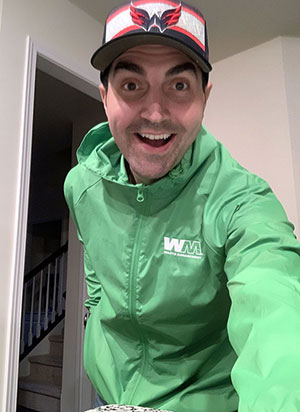
I am in a business partnership role. I focus on the commercial accounts, not on residential services. I deal with dumpsters and compactors, and also hazardous material. An aspect of what I do as an account executive is sales related, where I’m working and talking with people. I currently manage around 400 accounts that generate around four million dollars of revenue a year. Part of my job is taking care of and keeping people happy. As I grow these accounts and increase my territory, my income is uncapped.
However, I don’t look at a dollar amount as a benchmark for individual deal success. I try to look at every account relationship like a ten-year forecast. My goal is to grow long-standing relationships. Sometimes that means telling people things they don’t want to hear; however, relationships sometimes require being upfront and honest, even if it is a tough conversation. I want to build relations in which clients say, “Jonathan is my guy. I love this guy; he has integrity. He takes care of me and has always been fair.”
BALANCING SCHOOL, WORK AND FAMILY
You can’t go to school at a high level while also working for multiple years unless you have balance in your life. At 40, I’m happily remarried. My wife is 30 and is in graduate school to become a licensed counselor. So, one of our priorities is to get my bride graduated as fast as possible.
On the other hand, I’m doing great in my corporate job; I don’t need to rush to complete my degree. My priority is to have a work-life balance.
I do schoolwork in the morning from 5am to 8am — that’s it. I don’t do schoolwork between 8am and 5pm, while I am working for WM. I also don’t do schoolwork in the evenings or on most weekends.
In the evenings I prefer to hang out with my wife. We might go to a volleyball game, or watch shows together. Some evenings, I go to the gym, or my daughter and I ride motorcycles together. The only time I ever do schoolwork on the weekends is when I am not able to get a specific assignment done Monday through Friday.
And even then, when I do schoolwork on the weekends, or work on a big project due at the end of the semester, I do it from 5am to 8am on Saturday or Sunday morning before church, because I don’t want my school life to be a negative drag on everybody else.
ORGANIZATION, DISCIPLINE, AMBITION AND A COMPETITIVE SPIRIT
My super-competitive nature drives me to be organized. I don’t want to just make A’s; my goal is to have the highest average in the class. Am I innately competitive? Yes, I think so. I know my IQ, and while I’m slightly above average; ambition fuels my internal drive to succeed.
When I coach people on my team at WM about how I stay organized, I tell them that my secret power is that nothing slips through the cracks – not school, not work stuff, nothing. When I have 10,000 things going on in my job, I know exactly where every project is that’s in the works.
The key to my success is the discipline of being a morning person. Before joining the Marine Corps, I wasn’t a morning person – but I am now. When you exercise self-discipline to go to bed by 9pm, getting up at 5am isn’t early.
My goal is to get my schoolwork done within a specific window of time. During weekdays, the alarm goes off at 4:50am. Typically I am physically seated in my desk chair by 5am — because if I’m sitting here, then I’m working. I’ll do schoolwork until almost 8am, after which I’ll begin my workday as an account executive for WM.
Monday morning, each of the teachers post their syllabus a week in advance. So, I know what’s coming up for the week. On Monday morning, I’ll decide which one thing on my list I will get done. The moment that it is done, I’ll move on to the next task on my list. Sometimes I’m completely done with everything for the week by Thursday morning. Friday morning, I go to a men’s group at my church, so I don’t typically do any schoolwork on Fridays.
When I get my homework done within my window of time, I can spend 10 minutes in the morning having coffee with my wife and a stray cat we rescued. We named him Colonel Buhl after the battalion commander of my unit in Fallujah. The real Colonel Willard (“Willie”) A. Buhl is arguably one of the best officers the Marine Corps has ever had. But I have to get my schoolwork done first, so I can step away and have coffee time with my bride and this cat.
Obviously, larger reports and papers do take more time. So, I start working on them well ahead of the due date. And once I power through a reading assignment, videos, or whatever the homework assignment is, I just move on to the next thing. I’m racing to get to the finish line each week, because the moment I’m done, I know I’ve earned a free weekend.
It’s just organization and discipline. I’m not going to ‘do this thing, because first I need to do that.’ When my friends are wanting to go have a bourbon, I can’t have a bourbon with my buddies, because I get up at five in the morning. And you can’t do schoolwork when you’re cloudy, right?
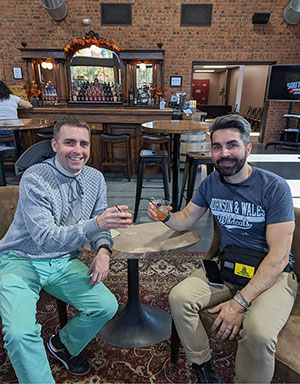
You have to take breaks. A break for a couple of days is almost like having a school vacation. When I’ve completed all of the assignments for that week — and my 99% average is still intact — then I’ll relax on the weekend. I will sleep in before church on Sunday morning. You have to earn that little bit of freedom.
It’s not forever. I like to joke when I tell people, ‘If I had to hold my breath for two years to get through school, I could probably do that.’ This is temporary “suffering” for a long-term reward — one that literally no one can ever take away from you.
SELF-ADVOCACY
More than maintaining the highest average in the class, I want to completely understand and be able to apply what I am learning in the finance program. If the light bulb does not come on, I will do an exercise over and over until I have a true understanding of the problem.
Good at math, I could sometimes “reverse engineer” an answer to a problem that I didn’t completely understand. By doing other similar problems in the chapter using the same formulas, I could come back to the original problem I was stuck on and get the right answer. But if I struggle a while and still don’t understand how and why that formula works, I will email the professor.
I don’t like to blow up everybody’s emails with problems, but I will always ask for help. I know that no one outside of myself is coming to save me; it is completely up to me to make sure that things make sense, so I can get everything possible from this education.
When I ask for help from a professor, I always make my request intentional. I don’t say, ‘Hey, I don’t get this problem #5, on page 214. I’ve never done that before.’ Instead, I’ll send my professor something that shows my work. ‘This is where I’m at. I completely understand this, this, and this — up to right here, I’m totally good. Beyond that, I don’t understand how this part came together to get here. This is how I got the right answer, but I just don’t understand why they wanted me to do it this way.’
My professor, Dave Cartwright, is a brilliant educator. Professor Cartwright’s course in Financial Reporting and Control felt like a regular accounting class times 1,000 — parts of his class were unbelievably complicated. I reached out to him during week three. Dr. C replied, “I’ve been teaching this for 12 years; week three is difficult for everybody.” I was thinking ‘No kidding, It’s hard. I’m smart enough to recognize when something is truly challenging. I’m giving it maximum effort and it’s still not clicking.’ Even though I am “math smart” I could not get some problems to work out in this finance course.
If I showed what I was working on to someone, their brain would slowly start to melt. The formulas and the math and the acronyms – there’s so many so that when you’re analyzing a business organization’s performance, and you’re looking at their operations and their net assets and their asset turnover ratios, the math part is not hard. But the complexity of a 100-page financial report for a 10-K public company, that gives a financial picture of the organization, is incredibly challenging.
Working through the documents, I am learning exactly where to find the place to plug in the formulas that create new numbers, and then use formulas to convert the numbers, then analyze all of that anywhere along those 25 steps. Drop the ball one time, nothing else is going to work. I might get to the end and have to say, ‘Well clearly, I’ve messed up somewhere.’
I’d been working on this one problem for two and a half hours and couldn’t see where I messed up. That’s when I communicated with Dr. C., saying something like, ‘Hey, this is what I’ve done: here, here, and here. By seeing my work, Dr. C. was able to know exactly where I needed his help: “Ah, this is what you’re missing.” And I thought, ‘Ah, there you go. Boom, the lightbulb’s on.’ Dr. C. was amazing.
When you are learning online, no one will be looking over your shoulder to make sure you are studying. You could probably fly under the radar, pass with C’s and slide toward graduation to get a degree. For me, learning everything that the professors are teaching is important. So, I go out of my way to give attention to detail in the course materials and to be organized in how I manage my studies. Clearly to complete this course at a high level, you have to keep up with the schedule of when things are due.
It is easier for the professors to help students who are trying to help themselves. An important skill as a student, and also at work, is self-advocacy – the ability to speak up when you need help. JWU students are not expected to suffer in silence. Every professor I’ve studied with at JWU Online has been absolutely amazing. All of my professors have responded to my emails very quickly. So, reach out when you need help.
THE POWER OF GRATITUDE AND OPTIMISM
This past March 2023, a week prior to the start of my next class, I unexpectedly suffered a cerebellar stroke. I was sitting right in the chair at my home desk, during a work meeting on Zoom. A vertebral artery dissection caused a clot to block the blood supply to the cerebellum (the part of the brain that coordinates balance and movement), which can damage or kill the brain cells in that area.
My wife’s quick response and my father-in-law’s diagnosis over the phone (he’s a family physician), saved my life. They got me to the hospital in record time. In three hours and 20 minutes, just within the critical window of time, I received TNK (anti-stroke) clot-busting medication. They advocated for my immediate treatment.
In the ICU, I knew that I needed to take eight weeks off from the program, and a month off of work, to recover. I talked with my advisor at JWU, Jessica Rounds—she was amazing. She said, “No problem, I’ll help you drop that class; we will push it off to later, no problem.” WM took care of me while I was out of work and made sure I wasn’t at all stressed about my job security or stressing about a continuing stream of income.
When I was ready to come back after having had the stroke, I came back hungry and ready to hit the ground. Six months later, I am still pulling straight A’s and I’m having the best year I’ve ever had at work. Surviving the stroke didn’t change how I feel about life; I should have been killed in Fallujah when the grenade went off 10 feet from me. Surviving the battle in Fallujah, I already had thanked Jesus that I had been given a second chance. Every day after Fallujah has felt like a bonus day.
Nothing I did or didn’t do caused me to have a stroke. I’m super fit, and I don’t have any heart or blood pressure problems. So, I’m just going to keep on living life and being happy, and trying to be a good Christian, a good husband, a good Dad, and to serve my church.
At 40, I couldn’t possibly be more grateful. Life is not perfect. It has not been an easy journey. Behind many of my life challenges and changes is a painful story. But I just make small adjustments and keep pushing forward and praying along the way. I have no complaints whatsoever; it’s crazy how good life is.
FOCUSING ON WHAT BENEFITS THE COMPANY
I’ve taken every opportunity during the program to focus my school projects specifically on WM. Almost every project I’ve completed involves comparing and contrasting WM with our closest competitor — a company that is a distant second to WM — and to comparing my company with the waste industry at large. Better for my purposes than earning a general MBA, it has been awesome being able to spend time focusing on my company.
Working for the largest company that hauls waste and recycling in North America, all of my projects in the program have helped me communicate our services to my current and future customers. So, I’ve started seeing the circle of applied education come together, where what I am learning in the finance program is making me a better, sharper employee, because I better understand the business and math side of my industry.
GUILD EDUCATION
As Americans, we have amazing opportunities to do all sorts of activities, many of them free or low cost. We can visit national parks; we can go out in nature and explore — we have so many ways to enjoy life.
For those of us fortunate to work for a large company that funds education for their employees, one of those amazing opportunities is Guild Education. Collaborating with Guild Education, WM offers their over 40,000 employees access to more than 170 fully funded programs, including undergraduate and graduate degrees and business certificate programs.
I’ve told everyone in my company that, ‘Guild Education is awesome. If you don’t know what you want to do, or you feel like you’re stagnating in your work, go find a degree or certification program that will help you grow.’
I read in WM’s literature that employees who are students, enrolled in the company’s educational partnership with Guild, are 60% less likely to leave WM. When I read that, I thought, ‘That’s definitely me. I don’t want to go anywhere. I just want to keep growing and progressing in my career with WM.’
AN UNEXPECTED JOB OFFER
Because I plan to stay with WM and grow in my position, I haven’t been searching for jobs related to the finance degree. However, are related jobs available? Absolutely. How do I know this? While I was taking my second accounting class, which is a required class in my degree program, my boss sent out a list of job openings in our South Atlantic area. On the list was an accountant position, level two. Most corporate organizations have four levels of accountants: 1,2,3 and a controller.
I had never done any work related to accounting. But I talked with my boss and told her about the accounting classes I had been taking, and that I thought I could do the job. With the blessing of my boss, I applied and interviewed for the position. The position had been open for a month, and they had interviewed about a bazillion candidates, but still hadn’t found the right fit. Based on what I know from my balancing and accounting classes at JWU, they made me an offer.
While I enjoy doing math in my current position, math is really just the background — like white noise — of what I do. Everything else is about people and soft skills. I like meeting and talking with people. When I spoke with my boss about applying for the accounting position, she said, “If you are going to apply for the accounting job and get hired, you will be focusing on numbers. You won’t be talking to people every day.”
For a few reasons, I chose not to accept the job offer, preferring to stay where I am while I finish my degree. But I had the option to accept the position.
If in the future I end up in an accounting career or become a financial analyst and doing pricing evaluations —which is kind of the goal — I would like to be one of the area pricing people that actually sets the price margins. I’d be talking with people saying, ‘When you’re evaluating your earnings before interest and taxes, here’s what we should charge.’
WHAT MAKES A STUDENT EXCEPTIONAL
I’m a full-time corporate career guy doing JWU Online’s graduate program through WM – Guild Education. I’ve chosen to focus projects for my program on my company, WM, and for personal development. There’s no guarantee that if I get a CPA certification, I could be an accountant for WM. That’s not instantly on the table.
I am not earning the finance degree with the expectation that when I graduate there will be any immediate “pot of gold” at the end of the rainbow. The gold is the knowledge I’m gaining in the MS – Finance program. The gold is the gratitude I feel for the WM – Guild Education partnership that is paying my tuition and my books, so that I can complete the finance degree.
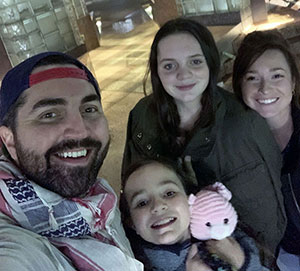
Like many adult students, I’m trying to balance school, work, and family. I want to be a high performer at work, make straight A’s in school, be a good husband to my wife, a good father to my kids, and have time to mow the lawn each week. I want to have integrity and be a someone people in my life can count on and trust.
I want to serve my community and church — ultimately, beyond personal ambition, my Christian faith and desire to glorify God in my life is what inspires my drive. And whenever possible, I want to make time to do the fun activities that I enjoy.
ANYONE CAN DO THIS
The Master of Science in Finance is an exceptionally challenging program. I am successful in the program in part because of my strength in math; however, more important is my drive, ambition, and self-discipline. I want to completely understand and be able to apply at work what I learn in the finance program. I bring the same drive to school and work as when I was in the Marine Corps. I am always 100% ready to show up and fight each day.
It helps to be organized, yet I am not nearly as organized as my wife – she’s amazing. I’m as organized as it takes to make a lot of money and make straight A’s. I’ve got sticky notes, lists of “things to do,” and a plan for how I manage my day that keep me on track. But in the rest of my life, I don’t stress about small things.
I truly believe that anyone who is interested and sufficiently self-motivated can successfully earn the MS – Finance degree. I can tell you the recipe for success, but you have to ask yourself whether you have the drive and self-discipline to balance work, school, and personal life. Can you endure a little less sleep? Are you willing to postpone some social life and recreational activities to make time for schoolwork? Do you have the faith in yourself and the fight to show up every day at your desk to do the work?
If you answer ‘yes’ to these questions, then you won’t regret the effort you put into getting a great education that will open doors in your life, by earning the Master of Science in Finance degree.
